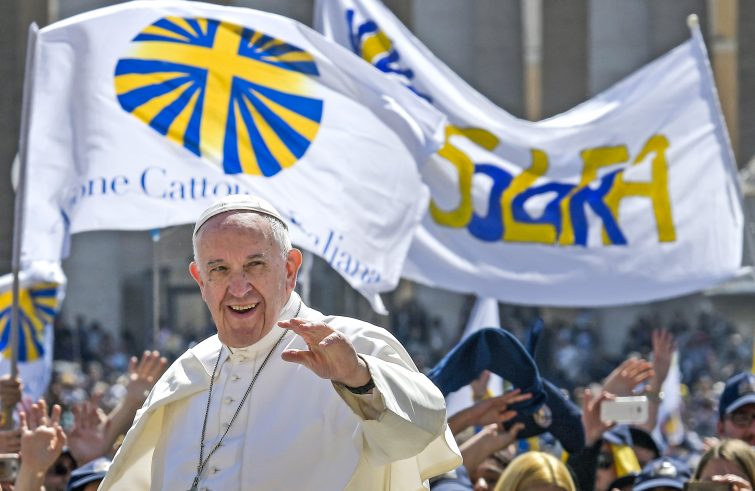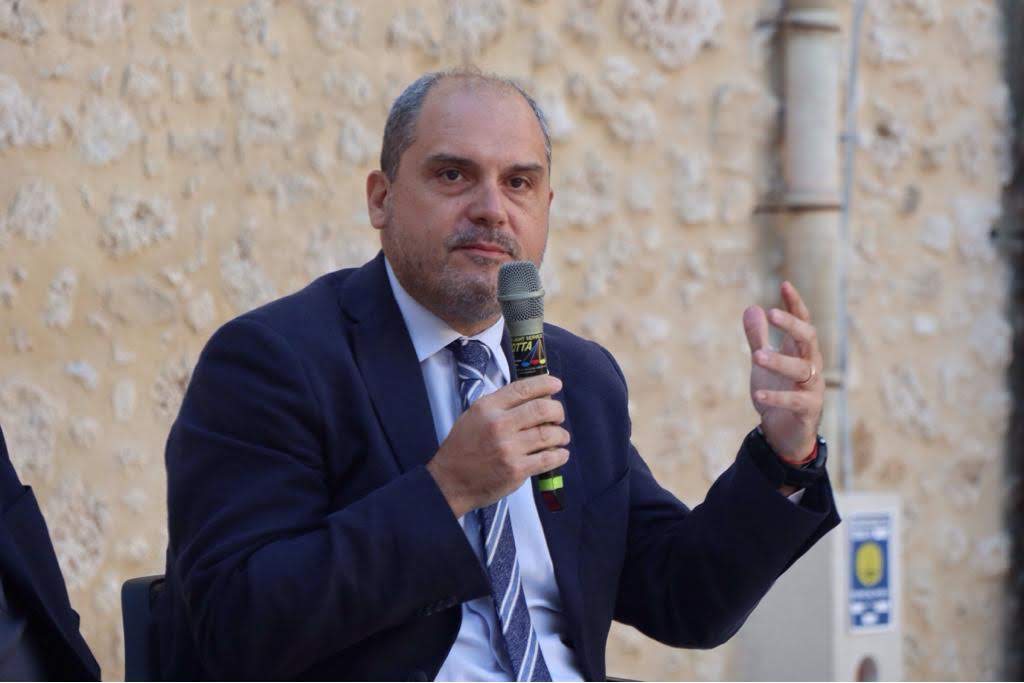
The meeting of the National Chapter of Catholic Action with Pope Francis, scheduled for the morning of Thursday 25 April 2024 in St Peter’s Square, is entitled “A braccia aperte” (‘With Open Arms’). More than 50,000 members and friends of the Italian section of Catholic Action will gather from dioceses all over the country for a meeting and celebration with the Pope. The event will bring together the people, the faces and the stories of every age group that have so much to say to our country and to the Church. The meeting with Pope Francis will be the prelude to the 18th National Elective Assembly of Catholic Action, titled Testimoni di tutte le cose da lui compiute, (Bearing Witness to His Works), which will take place in Sacrofano (Rome), at the Fraterna Domus, from the afternoon of Thursday 25 April to the morning of Sunday 28 April 2024. One thousand delegates from dioceses all over Italy are expected to attend. Together they will elect the National Governing Board of Catholic Action in Italy for the three-year period 2024-2027. SIR interviewed Catholic Action President Giuseppe Notarstefano.
 What conclusions can we draw from the past three-year period?
What conclusions can we draw from the past three-year period?
The best description of the past three years, in my view, is a picture of rebirth. The pandemic has put a strain on all the communities, because it exposed all the weaknesses we were aware of and which we had been working on over the years. These included the fatigue of formation, of group work, and of distancing from Christian life, combined with a waning ability to promote a culture based on the vision of the Gospel. All this deteriorated considerably, and we experienced its impact also as an Association, together with our communities. It was therefore surprising to see that even in very small communities, even in very peripheral areas, there was a significant revitalisation of associational life. But we prefer not to use the word ‘revival’ as a category, because revival implies going back to the way things were before.
We prefer to call it a renaissance. What is certain is that there is renewed enthusiasm. The figures show this, there is great dynamism. The number of books sold is another indication of the activities that are being carried out, and the number of members is growing.
What is the estimated increase in members?
We had a double-digit increase between 2021 and 2022, and then of 7% between 2022 and 2023. I expect that this trend will continue, because it is always the case when the national assembly take place, as it linked to the vote. This is no one’s achievement, it is a grace. We must know how to recognise, appreciate and cultivate this grace, which shows us that people are searching for authenticity in life at this time, and they find it in the life of the Gospel, in community life, in Eucharistic communities. I think this is important and it is a challenge that we must respond to.
What can be expected from the national Assembly?
The Assembly is an important moment. There are three different messages we wished to convey about this past three-year period: our first message was to say: “the assembly is not something extraordinary, because the democratic life of the association is an ordinary thing”, so we need to celebrate it with this idea of ordinariness, which is the daily practice of democratic life, building common ground through extensive, democratically-regulated debate. Secondly, the Assembly process should not be an event of internal associational life, a time when we pause for a moment, agree on who is going to be president and secretary, and then go back to what we were doing before. It must be a celebration that we share with the community, in which the association also discusses its challenges, its goals, from the perspective of the community. Finally, there is the issue of generational turnover.
There is association that is said to be very young. This is also an element of fragility, we put too much burden on the young. Perhaps some adults of my age could be a little more generous, step forward, take on a little more responsibility.
Instead, at the moment, our associative life is based on the generous, voluntary and competent commitment of people in their twenties, thirties and a few in their forties. While this is an important signal, we need to ensure that these people, this age group, are valued and at the same time that older adults have an ever richer experience of the Association.
You are meeting Pope Francis on 25 April. What kind of meeting will it be?
We will meet him “with open arms”. We had asked the Pope to attend as delegates of the Assembly. The Pope’s enthusiasm in responding to us was impressive, so we thought, ‘why keep it to ourselves?’ I believe there was a need for this moment, and we realised it was precisely so because the response in terms of participation was one of great enthusiasm. We will say to the Pope that we are grateful to him, that Catholic Action is grateful to Pope Francis for the things that he has said, for the things that he has done and for what he is offering to the Church and to the whole world, and that he intends to be present and to engage in the direction that he has shown us with very valuable doctrinal indications – Evangelii Gaudium in the first place – but also with the two extraordinary social encyclicals.
Catholic Action ascribes great value to them and is giving them renewed impetus for reflection on its self-understanding as an association.
We have decided to call this moment ‘with open Arms’ because we want to meet everyone. Over the last few years we have come to realise that we need other people, to form partnerships, to be part of networks, to work with everyone. Catholic Action is a slightly smaller organisation than it was thirty, forty or a hundred years ago. It is a little more modest, but it is happier, it is more passionate about working with others. We want to build alliances for the good of all. That is our goal and that is the purpose of this meeting.












